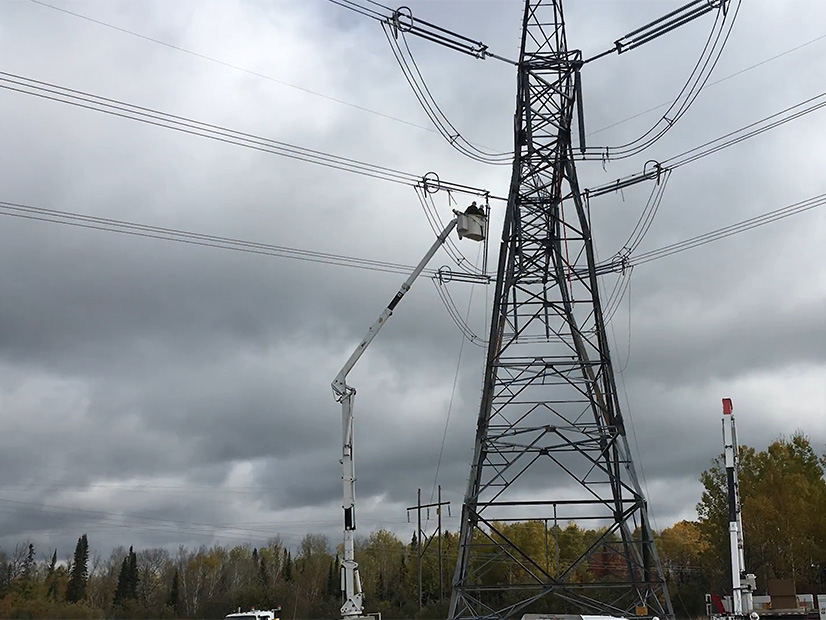MISO’s final 2022 Transmission Expansion Plan (MTEP 22) clocks in at 384 new projects and about $4.3 billion in construction costs.
MTEP 22’s $4 billion value is a marked increase over a 2021 plan that included 335 projects worth $3 billion, but more in line with the 2019 and 2020 cycles’ spending. The draft MTEP 22 called for $3.8 billion in spending over 364 new transmission projects. (See MISO Annual Transmission Package Nears $4B.)
The plan comprises 40 baseline reliability projects at $535 million; 67 projects to accommodate generator interconnections at $523 million; and $3.3 billion in 275 “other” projects for reliability, load growth and addressing aging facilities. MTEP 22 also includes two market participant-funded projects at $7.7 million.
MISO will recommend the MTEP 22 report for the Board of Directors’ approval in early December.
The plan’s costliest project is the $120 million for new static synchronous compensators necessary to reinforce the system in preparation for Ameren Missouri’s retirement of its 1.2-GW Rush Island coal power plant. The project’s expense is tied with Entergy Arkansas’ new $120 million Sandy Bayou 500/230-kV substation, which will tap into its existing Driver-Shelby 500-kV line to accommodate the state’s load growth.
Four of the other 10 most expensive projects are in East Texas to meet increasing load there.
Enviros: Plan for Growing Load, Aging Infrastructure
During a Thursday West Subregional Planning meeting, Clean Grid Alliance’s Natalie McIntire said MISO and stakeholders should have a better understanding of which aging infrastructure needs replacement sooner so the grid operator can pursue larger, more cost-effective projects that could supplant the need for future projects.
“It seems when you have an asset that has such a long life, you should have a better idea of when a replacement is necessary more than a year or two in advance,” she said.
McIntire asked why stakeholders don’t get more notice of projects addressing age and condition before the release of MTEP reports. Staff responded that transmission owners likely inspect facilities on a rotating basis, making it difficult to get a sweeping picture of aging elements.
“We’ve been asking for this for years, and it doesn’t seem that we’re going to get a good answer. … You can’t inspect all of your facilities in a year, but you should have a clearer picture of … when assets are getting to the end of their life, maybe five to 10 years in advance,” McIntire said. She said it appears MISO is giving its transmission owners too much deference in assessing system needs.
Iowa Office of the Consumer Advocate’s Tim Tessier also called for more transparency from transmission owners on aging facilities so the RTO can plan more comprehensive upgrades.
MTEP 22’s inclusion of several late additions by Cleco and Entergy for substation work in MISO South raised some eyebrows among clean energy advocates, who have said the region needs more cohesive transmission planning.
Cleco applied for expedited treatment to include the $15 million, 230-kV Marthaville substation and the $15 million, 138-kV Vernon substation in western Louisiana. Entergy requested the go-ahead to install two additional 230-kV breakers into its existing Legend substation near the Louisiana-Texas border. It also asked to construct a new 230-kV substation for about $1 million in the same area and a $32.6 million, 115-kV substation in northern Mississippi.
Both transmission owners said the substation projects are necessary to accommodate industrial load growth and can’t wait for the MTEP 23 cycle.
Southern Renewable Energy Association (SREA) Executive Director Simon Mahan said that though MISO allows stakeholders to propose study alternatives for expedited projects, the stakeholder community generally lacks insight into the grid operator’s and TOs’ analyses to suggest substitutions. He said stakeholders are in the dark regarding the extent of study alternatives, and he said he’s unaware of the RTO ever opting for a stakeholder-proposed alternative to an expedited project request.
SREA’s Andy Kowalczyk asked whether all the late industrial load growth applications in one cycle should prompt MISO to embark on a planning study on MISO South’s projected load growth. He said he is concerned over the length of agreements with industrial customers and the possibility of stranded costs for transmission facilities.
“Is this the most economical way to be planning?” he asked during a Wednesday South Subregional Planning meeting.
Edin Habibovic, MISO’s senior manager of expansion planning, called Kowalczyk’s query “a good question,” saying market competition makes it difficult to get early data from industrial customers about their expansion plans and energy needs. He also said TOs are often bound by non-disclosure agreements about load-growth projects.
MISO will review the MISO South expedited requests with stakeholders again during October’s Planning Advisory Committee meeting.
Stakeholders Ask for Special MTEP 23 Studies
The RTO has also been gathering input from stakeholders on the special studies it should conduct under MTEP 23.
Last month, MISO project manager Sandy Boegeman warned that the grid-operator’s long-range transmission planning (LRTP) is currently drawing a lot of manpower and resources, possibly limiting the ad hoc planning studies for MTEP 23. MTEP 22 didn’t contain any supplementary studies for the same reason.
The Organization of MISO States has asked the RTO to continue concentrating on LRTP planning and pay special attention to finding projects that expand the Midwest-South transfer constraint.
Other stakeholders have asked MISO to study the historic levels of congestion in MISO Midwest, potential impacts from widespread adoption of energy storage, and future thermal generation retirements in Illinois under of the state’s Climate and Equitable Jobs Act.




